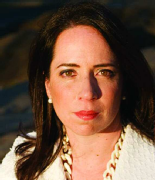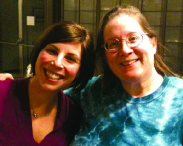Alexandra Migoya '93 and Hilary Johnson '05 & Rebecca Slivka '83, MArch '86
¡Hola!
Alexandra Migoya '93

When Alexandra Migoya was looking for an after-school Spanish program for her two daughters in their home city of Washington, D.C., she was disappointed with what she found. "Many Spanish teachers these days are using a lot of slang, a lot of Anglicisms," says Migoya, a former corporate lawyer who majored in the language on the Hill. "I visited one class where the teacher used troca for 'truck' instead of camión, and I was like, are you kidding me? That is not what Spanish is. This is the language of Cervantes, of Gabriel García Márquez."
After her search for the perfect program proved futile, Migoya and a friend decided to start their own. Opened in 2009, Isabella & Ferdinand Spanish Language Adventures offers classes after school and on weekends for students aged one to ten, all taught by native speakers. Some sessions are geared toward bilingual children, while others cater to kids who are new to Spanish.
Migoya and her partner created the school's curriculum, in which music features prominently. In April, the school released Olé & Play, a CD of thirteen original songs on topics from Pablo Picasso to Don Quijote. "Using music in the classroom allows students not only to learn proper pronunciation," says Migoya, the daughter of a Spanish father and a Dominican mother, "but is also a great way to teach about culture." The school's ultimate goal, she says, is to show children the richness of Spanish and Latin American language and heritage—and not just the obvious, Americanized variety. "When a lot of teachers teach culture, they focus on food," says Migoya. "My joke to the teachers is, 'If you can teach Mexico and never once use the word taco, I will be infinitely grateful.' "
— Adrienne Zable '11
Double Word Score
Hilary Johnson '05 & Rebecca Slivka '83, MArch '86

Every Tuesday night, Hilary Johnson and Rebecca Slivka join the other members of the Seattle Scrabble Club, paying $6 to play the game for four hours straight. But the weekly meetings are just one aspect of the friends' Scrabble addiction. Slivka and Johnson each spend more than fifteen hours per week honing their Scrabble skills by studying wordlists, playing online, and competing in tournaments around the Pacific Northwest. "Sometimes," says Johnson, "I even play Facebook Scrabble between games at the club—with people who are also at the meeting."
Long before playing competitively, Johnson and Slivka each enjoyed the game as children. In 2009, when Johnson moved to the Pacific Northwest to pursue a master's in education at Seattle University, she joined the club as a way to meet people. That's when she met Slivka, a computer consultant and the club's director. "Rebecca was the first person to invite me out to do anything social in Seattle," remembers Johnson, "so she served this dual purpose of Scrabble mentor as well as friend." Slivka, too, enjoys the game's social aspects. "At tournaments, you meet a lot of people from around the country," she says, "and online you can play with people you know and keep in touch that way."
Other perks of competitive Scrabble can include cash prizes; tournament veteran Slivka has won $3,000 so far. Then there's the expanded vocabulary; Johnson's favorite play is "jiao," which she discovered by studying wordlists. "I don't know what it means," she admits, "but I've learned the hard way that you can't put an 's' on the end of it." (It's a unit of Chinese currency.) But for the most part, says Slivka, playing the game is its own reward. "It's a way to let loose intellectually," she says. "The great thing about Scrabble is that you never know what letters you're going to pull out of the bag."
— Adrienne Zable '11


